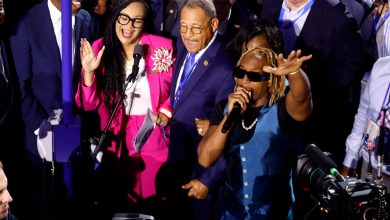Maxine Waters Likens Kamala Harris At DNC


U.S. Rep. Maxine Waters, Democrat of California, speaks on the first day of the Democratic National Convention (DNC) at the United Center in Chicago, Illinois, on Aug. 19, 2024. | Source: MANDEL NGAN / Getty
California Congresswoman Maxine Waters offered a profound history lesson while alluding to a potential full circle moment Monday night during her speech at the Democratic National Convention (DNC) in Chicago.
Speaking triumphantly to a packed United Center in Chicago, Waters linked Kamala Harris’ historic presidential candidacy and nomination to one of the civil rights and political activism of Fannie Lou Hamer, whose determination to and dedication to fighting for voting rights is the stuff legends are made of.
MORE: Things Black Voters Should Know For The Democratic National Convention
Waters told the audience the story of Hamer demanding to no avail that she and a group of Black delegates from Mississippi be seated at the 1964 DNC in Atlantic City, New Jersey, instead of the state’s all-white delegation. Hamer ended up asking, Waters said, “Is this America?”
“[Hamer] didn’t get the outcome she was hoping for in Atlantic City, but you can bet that when the official Mississippi delegation was seated at the convention four years later, Fannie Lou Hamer was sitting there with them,” Waters said to rousing applause.
“Now here we are, 60 years later at another DNC with Kamala Harris as our party’s nominee,” Waters continued before adding that once Harris is elected, “I know she’ll be thinking about Fannie Lou. … In that moment, all of us … we can ask ourselves – is this America?”
Waters answered her own question: “We will be able to say, loudly and proudly, you’re damn right it is!”

(Original Caption) 8/22/1964-Atlantic City, NJ-: Mississippi Freedom Democratic Party delegate Fanny Hamer speaks out for the meeting of her delegates at a credential meeting prior to the formal meeting of the Democratic National Convention | Source: Bettmann / Getty
To be sure, Hamer is who people are referencing when they speak of the Black women being the backbone of the Democratic Party.
The one-time member of the Student Nonviolent Coordinating Committee (SNCC) — a student-led organization that spearheaded some of the most iconic sit-ins at segregated lunch counters across the South and played a critical role in fighting back against segregation during the civil rights movement — worked tirelessly to register Black voters in Mississippi despite facing violence and intimidation.
Throughout her career, Hamer continuously spoke out against racism and oppression. She is perhaps best known for her aforementioned powerful testimony at the 1964 Democratic National Convention, where she gave a historic speech about the injustices faced by Black Americans in the South. She was also a vocal opponent of the Vietnam War.
Life changed drastically for Hamer after she was brutalized in a Montgomery Jail in 1963. While she sustained permanent injury from the ruthless beating, the activist used the challenging experience as fuel to accelerate her civil rights work. In addition to her work with the SNCC, the social justice titan co-founded the Mississippi Freedom Democratic Party, which challenged pro-segregation politicians across the south. She also ran for Congress, according to PBS.
“Sometimes it seems like to tell the truth today is to run the risk of being killed. But if I fall, I’ll fall five feet four inches forward in the fight for freedom. I’m not backing off,” Hamer once said during a powerful speech.
Hamer died in 1977, but her legacy continues to inspire activists today. Her fearless leadership paved the way for future generations of Black women in the fight for civil rights.
SEE ALSO:
GOP Rep. Nancy Mace Calls Black Men ‘Boys’ After Mispronouncing Kamala Harris’ Name
Trump Falsely Claims Kamala Harris Used AI To Make Her Michigan Crowd Appear Larger





